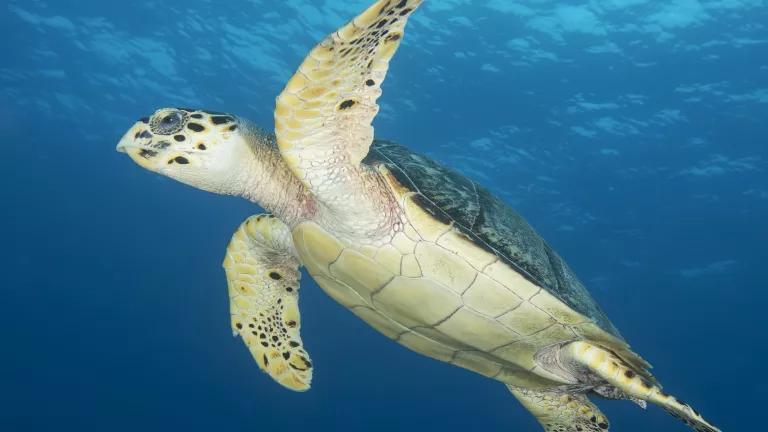House Committee Takes Partisan Vote to Approve Bill that Guts Protections for Fisheries and Economies that Depend on Them
It was back in January when I reported on a draft bill that House Natural Resources Chair Representative Doc Hastings (R-Central WA) offered to reauthorize the Magnuson-Stevens Fishery Conservation and Management Act (MSA). In its draft form it was a virtual roadmap to reversing all of the success we’ve had in rebuilding depleted ocean fisheries around the country and turning back the clock to the era of boom and bust fisheries management. And when Rep. Hastings introduced his official bill on the Friday before the Memorial Day Weekend, it remained such a roadmap. The bill, H.R. 4742, not only guts the MSA, it also goes after other bedrock environmental laws, including the National Environmental Policy Act (NEPA) and the Endangered Species Act (ESA).
The Magnuson-Stevens Fishery Conservation and Management Act governs how we use (and conserve) our nation’s fisheries. This law was amended in 1996 and 2006 with strong bipartisan support to include provisions to end overfishing and rebuild depleted fish populations. These amendments have been strikingly successful, addressing the worst impacts of overfishing off our coasts. By the early 1990s, many important fish stocks, such as the iconic New England cod, had suffered large declines or collapses. Today, while challenges remain, many of these stocks have been brought back. NRDC’s “Bringing Back the Fish” report documented how nearly two-thirds of fish stocks put in rebuilding plans since 1996 have either rebuilt to healthy population levels, or have made significant rebuilding progress, resulting in increased gross commercial revenues of $585 million—92% higher (54% when adjusted for inflation) than before the rebuilding plans.
Based on this incredible success, and the broad economic benefit it has provided to coastal communities, H.R. 4742’s hatchet-job to the current law is a big mistake. Perhaps some commercial fishing industries will be able to extract short-term benefit from this weakening of the law, however, the vast number of businesses and communities that rely on healthy fisheries will be worse off in the long-term. The nation’s fisheries are heavily relied upon by many users, including recreational and charter fishing industries, small and large commercial businesses and countless others whose coastal communities rely on the bounty of the ocean. Without addressing how we can sustainably use this resource, and properly plan for all the competing needs offshore, we will undoubtedly spoil our shared resources and return to a time when there were only empty nets with nothing left to catch. This bill does just that and its provisions include:
- Gutting the law’s successful fisheries rebuilding requirements – The current law requires that overfished fish stocks be rebuilt in as short of time as possible, not to exceed 10 years, with certain limited exceptions. This requirement has resulted in a major rebound in many U.S. fish populations. H.R. 4742 removes the requirement to rebuild within 10 years if biologically possible. It also goes further and removes any time limit if a regional fishery management council uses one of the numerous exceptions included in the bill. What makes this even worse is that the current law already provides for significant flexibility from the 10 year timeline. In fact, the average time period in rebuilding plans to date is almost 20 years under the current law.
- Drastically weakening the law’s requirement for annual catch limits – In 2006, Congress added a requirement for science-based annual catch limits (ACLs), including accountability measures, for all federally-managed stocks with limited exceptions. Since then, the percentage of federal stocks subject to overfishing has dropped from about 20% of stocks with known overfishing status to less than 10%. The Hastings bill, however, would eliminate the requirement for ACLs for hundreds of other valuable stocks, including stocks that are overfished or subject to overfishing.
- Attacking bedrock environmental laws, including NEPA, ESA, the National Marine Sanctuaries Act, and the Antiquities Act – H.R. 4742 would exempt federal fishery management actions from NEPA, removing important opportunities for public input. It would also undermine the ESA by putting the industry-dominated fishery management councils in charge of recovering endangered and threatened marine mammals, sea turtles, and other vulnerable ocean species impacted by fishing, as well as in charge of the effects of fishing activities in national marine sanctuaries and national monuments.
- Making secret vast amounts of fisheries information, including information developed using taxpayer dollars and collected by taxpayer-funded scientists – H.R. 4742 would make many types of fisheries-related government information secret from the public, including the results of cooperative research funded by taxpayer dollars and data collected by government-funded biologists that are placed on fishing vessels to monitor catch of fish and endangered species.
Thankfully, there were members on hand in the Committee markup to stand up for protecting fisheries and the communities that rely on them. Ranking Member Peter DeFazio (D-OR) led the Democrats in addressing problems presented in the bill and advocated for a strong reauthorization that protects our valuable fishery resources. There were a number of amendments offered in an effort to address some of the bill’s major problems. For example, Representative Rush Holt (D-NJ) attempted to amend the bill to reverse the ACL exemption; Representative Niki Tsongas (D-MA) offered an amendment to improve the likelihood that a rebuilding plan will succeed; Representative Alan Lowenthal (D-CA) offered an amendment to protect the environmental laws that this draft gutted; Representative Madeleine Bordallo (D-GU) offered an amendment to prevent data being kept secret when it would enhance national security or ensure fishermen continued access to fishing grounds; and Representative Kilili Sablan (D-MP) offered an amendment to blunt the bill’s damage to the rebuilding requirements. Unfortunately, only Representative Bordallo’s amendment was agreed to.
In addition to these amendments, some members implored their colleagues to consider this bill’s far reaching negative impact to critical fisheries. Representative Jared Huffman (D-CA) pointed out the extensive problems with loopholes in the law that would lead to long term harm, while Representative Rep. Frank Pallone (D-NJ) expressed his concern over the gutting of critical environmental laws such as NEPA, ESA and the Sanctuaries Act.
The bill was passed with a partisan vote of 24 to 17 (with only one Democrat, Representative Joe Garcia (D-FL) voting in favor of the bill). This damaging bill may eventually end up being debated on the full House floor. That will be the time when coastal members from around the country will have to stand up and speak on behalf of protecting their local fisheries and economies that depend on them. Fishing communities, small and large industries around the nation and countless others have worked extremely hard for years to rebuild fisheries around the country – it would be a shame to see all that work undone by a flawed bill that ignores years of bipartisan work to protect such a critical resource for so many people.



